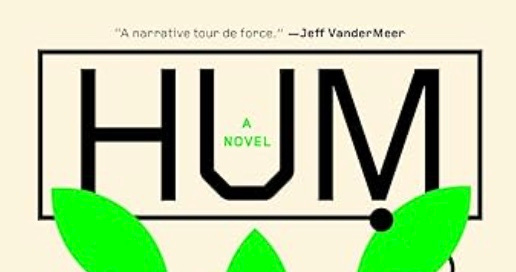BookLife Review by Carol O’Day: Hum (Helen Phillips, author)
Science fiction, dystopian future, humanoid robots, AI gone awry, family drama, loss of employment, facial alteration surgery, parenting, missing children, child protection investigation
Hum by Helen Phillips is a cautionary tale about a dystopian future, where AI has reached the tipping point and no longer requires human input and training. Protagonist May is an AI training specialist who rendered herself obsolete by completing the AI training of the humanoid robots, called hums. Hums facilitate all areas of everyday life, from grocery delivery to customer service, to government offices and retail experiences. May’s husband, Jem, is the family’s secondary earner who works gig tasks through an app, doing everything from specialty shopping to mouse-trap disposal.
In the universe created by Phillips, not only are robots ubiquitous and frighteningly human-like, but homes are filled with AI devices. Each child wears a Bunny, which is an apple watch-like device that has internet connectivity, provides regular air quality ratings for the climate damage outside world, and all manner of apps to facilitate daily living. The Bunny also operates as a tracker which integrates with parents’ devices so that parents can always know a child’s whereabouts. In addition, each family member has his or own “woom” in addition to a bed. The woom is an egg-shaped pod that uses generative AI to respond to individual interests, needs and preferences. Wooms soothe and inform each member of the family, and regularly market to them as well. As needed wooms can imitate an actual womb, with heartbeats and pulsing uterine imagery.
The book opens with May’s job loss, and her decision to supplement the family income by undergoing facial alteration surgery in exchange for nearly a year’s salary. A company experimenting with face recognition software is attempting to determine which minor alterations obfuscate facial recognition. With the handsome payment she receives, May decides to treat her family to a getaway weekend at the city’s Botanical Garden, a park-like attraction in the city center where families can escape the climate damaged city and immerse themselves in “nature.”
The visit goes awry when May and Jem fall asleep by a waterfall in the park and their two children go missing. With the “assistance” of some of the park’s hums, footage of their stay recorded on hidden cameras is gathered, alerts are activated and city closed circuit tv footage is searched. Unbeknownst to May and Jem, the footage is leaked to the public to aid in the search and goes viral. With the governing AI, these circumstances trigger an automatic investigation by the equivalent of Child Protective Services to determine whether May and Jem should be permitted to retain custody of their own children. Not unexpectedly, the investigation compels them to share with the government access to all of their family’s devices and data.
The story is fairly compelling. It bears so much resemblance to our current day lives, just amped a bit with likely future iterations of our devices, that it’s vision of AI gone awry used against a family is horrifying in its believability. A gut-wrenching sense that such a scenario may visit us in the not very distant future. That said, the final fifth of the book goes a bit off the rails. An investigator hum arrives at the family’s home, and seems to go rogue. The hum appears to undertake independent action to advocate for May and Jem. The hum’s insertion into the family dynamic to await the results of the investigation is both creepy and somehow out of sync with the tenor of the novel to this point. While the message is clearly that AI is out of control in this universe, this level of intimacy with the hum is not adequately foretold in earlier chapters of the novel and seems misfit. The ending of the book leaves me befuddled. I do not yet understand its meaning. Perhaps you will.
Please support BookLife: Reviews for Readers and independent booksellers by purchasing Hum from the BookLife shop using the Bookshop.org link below.





